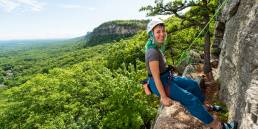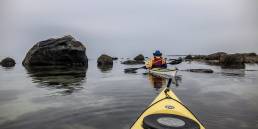Group dynamics in the backcountry change constantly, often as a result of the major variables involved in decision making: the members, the activity at hand, the collective skill level, the acceptable level of risk, and goals.
In most cases, any recreational outdoor group has a trip leader. Whether that person is a professional guide from the EMS Climbing School or an avid weekender with the most experience in a group of friends, he or she plays a vital role in managing those variables and, of course, having fun.
Whether you are a seasoned trip leader, or if you are ready to take the first step into such a role, these tried-and-true skills are essential in the backcountry.
1. Identify your leadership style, play to your strengths, and understand your weaknesses
There are numerous known leadership styles, all of which have their own strengths and weaknesses. Like the Adirondack High Peaks or the White Mountains, none are better or worse than the others – they are just different. Are you someone who is naturally vocal? Or, do you spend less time explaining, and lead the group by your own example? Do you work more effectively with a co-leader or by yourself? Do you help lead the group to a decision on their own? Or, do you tell them what the decision will be ahead of time?
All of these attributes, then, can be used effectively in different situations. While honing the skills that allow you to lead well, think critically about how you act and what tools you can use to continually improve.
2. Develop a keen sense of when to assume a dominant leadership role
Don’t be afraid to be a dominant decision maker, especially if the trip plan includes a higher level of risk and safety is a concern, but realize that nobody likes a dictator. In a less risky situation, try observing what decisions happen naturally within the group without your input, and remember that subtle suggestions can go a long way.
Talking through a situation with others can open up multiple options and helps prevent overlooking vital information or observations. Along this line, while a high-performing group may not feel like it needs someone in charge, an experienced leader might notice this and then use it to facilitate good communication and discussion amongst all members.
3. Delegate tasks throughout the trip
As a leader, it is impossible to do everything yourself, and if attempted, this can make for a lousy trip. Many times, the toughest tasks aren’t what’s directly at hand but, rather, being able to complete them efficiently without losing the ability to stay on schedule.
A perfect example of this is the transition between breakfast cleanup, campsite breakdown, and hitting the trail. I have seen this process become slow and sloppy multiple times, especially with individuals who haven’t spent time in the backcountry together before. Here, an effective leader might recognize this problem, visualize what needs to get done, and delegate accordingly.
4. Keep your goals realistic and open-ended
Nobody likes to go home after an outing without completing the one goal they set out to do. Even worse, your friends may not want to go on a trip with you ever again! Especially if you are planning a longer adventure, it can be extremely rewarding to set different stages of goals: one you will certainly achieve, one you will likely achieve, and one you may not achieve. Not only does this let everyone leave feeling satisfied, but it further builds excitement and drive for returning to complete anything you weren’t able to accomplish the first time around.
Remember that if you aren’t the designated leader, your role within the group is equally as important. Speak up, share opinions, and ask questions if something doesn’t seem right or if you are making observations that no one else has made.
One of the most valuable ways to become an effective leader is to learn from and be led by one. Eastern Mountain Sports Schools offer trips and courses with some of the most experienced and knowledgeable leaders around. To book a course or find more information, visit http://www.emsoutdoors.com.
Patrick Scanlan
Patrick is a part-time guide with the EMS Climbing School and a lifelong explorer of the forests and peaks of the White Mountains. Previously, he has worked in the High Huts of the Appalachian Mountain Club and he lived for 2 years in Tuckerman Ravine as the Caretaker of Hermit Lake Shelters. He has been involved with professional and volunteer rescue with the AMC and Androscoggin Valley SAR in Tuckerman and Huntington Ravine and the greater Presidential Range. Currently, Patrick is the program director for a backcountry skiing team of high school shredders at Carrabassett Valley Ski Academy at Sugarloaf, Maine. He is currently an American Mountain Guides Association(AMGA) Apprentice Ski Guide and Apprentice Rock Guide.




